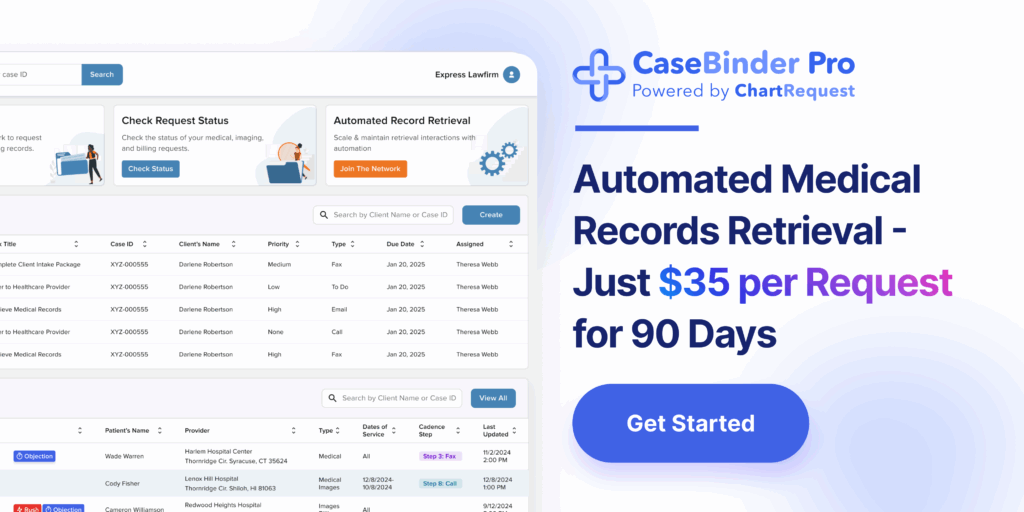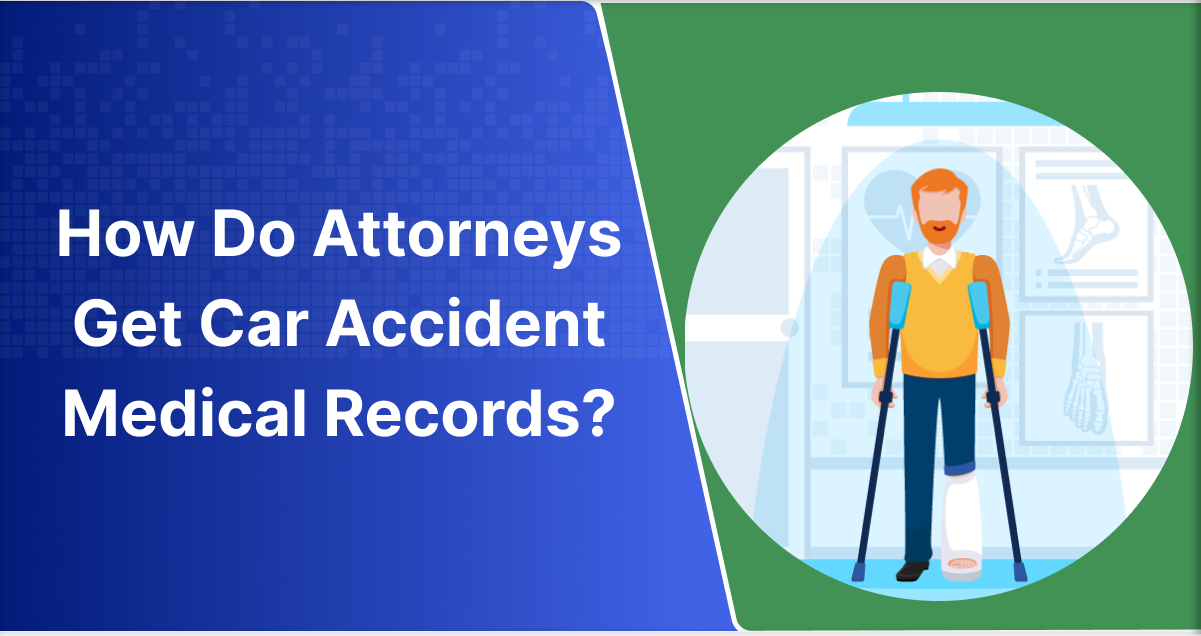Getting clients the compensation they deserve after a car accident usually requires attorneys to get their medical records, and it’s an unfortunately common job. Police reported crashes were over 6.1 million in 2021, according to a report by the Fatality Analysis Reporting System (FARS).
Given this number, every personal injury attorney needs to invest in an efficient system to help manage car accident medical records for clients. Prompt and accurate retrieval of these records from healthcare facilities can make the difference between success and loss.

What are Car Accident Medical Records?
Car accident medical records are the documentation of any medical treatment or procedures received by a person involved in a car accident. These records contain vital information such as:
- The date and time of the accident
- Type of medical treatment received
- Prescribed medications
- Medical diagnoses and reports
- Prognosis and future care recommendations
The information contained in the car accident medical records is essential. It helps determine the severity of injuries sustained from the accident for building a strong compensation case.
Medical Records Needed in Car Accident Case
In car accident litigation, the attorney relies on various types of medical records to construct a strong case. Each document is important in definitively establishing the nature and severity of injuries, ongoing medical requirements, and the impact of the accident on the client’s quality of life
By gathering this comprehensive array of evidence, the attorney can effectively advocate for their client’s rights and seek appropriate compensation.
Medical records needed in a car accident compensation case include:
- Emergency Room (ER) Records: These documents include initial assessments, treatments, and procedures provided in the ER immediately after the accident.
- Hospitalization Records: If the accident resulted in a hospital stay, these records detail the treatment and care received during the stay.
- Surgical Reports: If a surgeon provided treatment after an accident, these reports provide specific details about the operation, findings, and post-operation care.
- Radiology Reports: These reports include DICOM images like X-rays, MRIs, CT scans, and any other imaging studies conducted to assess the extent of the injuries.
- Physician’s Notes: Regular notes from follow-up visits to doctors, specialists, and therapists provide a timeline of recovery and ongoing medical needs.
- Physical Therapy Reports: These reports offer insight into the ongoing rehabilitation needs and the progress of recovery.
- Prescription Records: Records of prescribed medications can show the severity of pain and other ongoing symptoms.
- Medical Bills: These documents prove the financial impact of the accident.
- Future Treatment Plans: Recommendations for future medical needs can help establish ongoing and future costs related to the accident.
Challenges in Managing Car Accident Medical Records
One of the main challenges in managing car accident medical records is retrieving them from different healthcare providers. This process can be time-consuming, and it involves contacting each healthcare facility and requesting the specific records needed.
Depending on the ROI process of the healthcare facility, it may take days or even weeks to receive the records. Several factors can slow down the Release of Information process, such as:
- Privacy Laws: Expansive regulations like HIPAA rigidly protect medical records and other PHI. These legal requirements can often delay the retrieval process.
- Decentralized Records: If a patient has seen multiple healthcare providers, their records may be spread across different facilities or systems. This makes it harder to gather car accident medical records quickly.
- Facility Response Time: Some healthcare facilities may take significant time to respond to requests or to locate and compile the requested records. This is even more true for cases involving older records.
- Complex Systems and Technologies: Each healthcare provider typically uses a unique system for their record keeping, which can complicate and slow down the retrieval process.
- Incomplete Information: In some cases, records may not be complete or accurately reflect all aspects of patient care, requiring additional follow-up and time.
- Costs: HIPAA allows healthcare facilities to impose reasonable, cost-based medical copying fees associated with obtaining these records. This can cause delays, especially if there are disputes about who should bear these costs.
Efficient management of car accident medical records is critical for a successful case. Without accurate and timely access to these records, it can be challenging to prove the extent of injuries sustained or the medical expenses incurred by the client. This can lead to a weaker case and possibly result in a lower compensation amount.
How Delayed Car Accident Medical Records Affect Your Case?
Delays in accessing car accident medical records can have various detrimental effects on your case, including potentially losing the case. Examples of potentially critical delays include:
- Difficulty Building a Strong Case: The longer it takes to retrieve the records, the harder it becomes to build a strong case.
- Inaccurate Information: If there are delays in retrieving records, there may be inconsistencies or missing information in the records provided. This can weaken your case and reduce the chances of getting a fair settlement.
- Delays in Settlement: Delayed access to medical records can prolong the legal process, leading to delays in settling. This means your client may have to suffer longer before receiving compensation for their injuries and damages.
- Longer Legal Proceedings: The longer it takes to gather and review medical records, the longer it takes for a case to be resolved. This can lead to higher legal fees, which may not be desirable for your client.
- Reputation Damage: Inefficient car accident medical records management can affect your law firm’s reputation. Clients may perceive delays in obtaining records as an issue on your part, reducing their chances of recommending your services.
In worst-case scenarios, insurance claims or settlements can be denied because of incomplete medical records. In fact, 5-10% of insurance claims are denied because of incomplete or total lack of documentation on the part of the victim.
The Medical Record Request Process for Attorneys
Attorneys must follow a specific process when they require access to medical records to ensure compliance with legal and privacy regulations. Sometimes these rigorous steps are the main reason for delays in fulfillment.
Here is an overview of the steps involved:
- Obtaining Consent: As a first step, the law firm obtains written authorization from their client, which is crucial to comply with privacy laws including HIPAA. The authorization form specifies the client’s full name, date of birth, details of the required records (such as treatment dates and record types), the purpose for requesting the records (e.g., for an injury case), and the designated recipient for the records.
- Submitting a Formal Request: The law firm submits the patient’s authorization to a healthcare provider to initiate the request.
- Managing Associated Costs: Retrieving medical records may involve certain fees, and the law firm should prepare to cover these expenses.
- Monitoring the Request: Law firms frequently follow up with the healthcare facility to track the progress of the request and ensure timely processing.
- Reviewing the Records: Once the requested records are received, the law firm carefully examines them. The law firm can then follow up with the healthcare provider if any vital details are missing.
Benefits of Medical Record Management Tools for Car Accident Lawyers
Obtaining, managing, and analyzing personal injury medical records can be difficult for law firms. While HIPAA compliance ensures patient privacy, it can be a hindrance for lawyers looking to obtain these records efficiently. This is where a medical record management tool can help law firms.
Using sophisticated technology in managing car accident medical records can help simplify the process by providing:
- Streamlined Retrieval: Digital tools can simplify the retrieval process, reducing the time spent on contacting individual healthcare facilities. The leading tools can also send requests to multiple providers simultaneously, expediting the collection process.
- Improved Accuracy: Technology ensures precision in the retrieval process. It eliminates human error to help custodians provide accurate, complete records that strengthen personal injury cases.
- Easy Accessibility: With cloud-based systems, records are available anytime, anywhere. Lawyers can access the required information without the need to sift through piles of paperwork.
- Online Tracking: As an electronic health information management tool, you can track the progress of their requests online. They no longer have to play phone tag with healthcare providers or worry about lost requests.
- Time-saving: Automation significantly cuts down the time spent on record retrieval and management. This allows legal practitioners to focus more on case strategy and client handling.
- Organized Data: Digital tools offer a structured way of organizing records. They provide easy search options to help facilitate prompt records retrieval.
Reliable ROI solutions can significantly boost your medical records management process and improve the overall efficiency of your legal practice.
ChartRequest: A Solution for Car Accident Attorneys
Since 2012, ChartRequest has dedicated itself to aiding the requestor community in securing medical, billing, and imaging records from healthcare providers.
ChartRequest offers more than just retrieval services for law firms; we prioritize security and strictly comply strictly with all legal requirements. With our regular internal audits and monthly verification of state pricing statutes, you can rely on ChartRequest for accurate fulfillment of protected health information (PHI) requests.
This effective combination of efficiency, security, and compliance makes ChartRequest an excellent solution for personal injury attorneys who need car accident medical records.
ChartRequest also has an array of features that streamline and speed up the medical records retrieval process for attorneys, including:
- Multiple Requests: ChartRequest enables law firms to send several requests for a client’s records at once. This eliminates the need to contact each healthcare provider individually, saving time and reducing overhead costs.
- Automated Retrieval: This feature simplifies the process by automating the retrieval of records. It reduces manual work, leaving more time for case strategy.
- Fast Turnaround Time: ChartRequest’s average turnaround time for record retrieval is 2 days, a huge improvement over the industry standard of 30 days.
- Cloud-Based System: The platform is cloud-based, providing easy access to records anytime, anywhere.
- Organized Data: Retrieved records are neatly organized and easily searchable within the platform. This feature makes locating specific data faster and less tedious.
- HIPAA-Compliant: ChartRequest is fully compliant with HIPAA, ensuring records are handled properly and safely. This reduces the risk of legal issues that could slow down retrieval.
- Internal Audits and Verification: The platform conducts regular audits and monthly verification of state pricing statutes. This ensures accuracy and compliance, further enhancing retrieval speed.
Each of these features aids in making medical record retrieval faster, more secure, more efficient, and more reliable. This leads to more robust cases and happier clients for your law firm.
Want Faster Medical Record Retrieval? Partner with ChartRequest for Quicker Turnaround Time!
Investing in technology for your legal practice will give you a leg up over other competitors.
Digital ROI solutions like ChartRequest streamline the process of record retrieval. Our platform is designed to ensure that we retrieve comprehensive and accurate medical records that you will need to build a strong case for your client.
Enhance your legal practice with the tool that saves you time while fostering a more organized, efficient, and future-ready law firm. Adopting ChartRequest will expedite your car accident medical record request process.
Our fastest turnaround time is two days. This will give you plenty of time to build a robust case for your clients instead of spending time scrambling for decentralized medical records.
Join over 12,000 legal professionals who are enjoying the ROI service ChartRequest provides Explore our solutions and partner with us today! We also offer a live demo with no strings attached!


